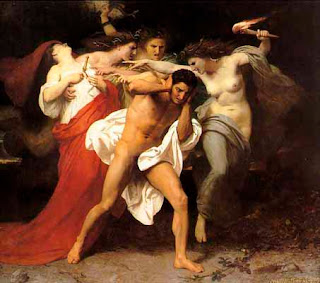Hilaire Belloc (1870-1953) could be a bit sardonic at times. (Perhaps I am understating the case.) Let's just say that he viewed the world with the proverbial gimlet eye. But a humorous gimlet eye. Please bear this in mind as you consider the explanation of Life offered by him in the following poem:
Discovery
Life is a long discovery, isn't it?
You only get your wisdom bit by bit.
If you have luck you find in early youth
How dangerous it is to tell the Truth;
And next you learn how dignity and peace
Are the ripe fruits of patient avarice.
You find that middle life goes racing past.
You find despair: and, at the very last,
You find as you are giving up the ghost
That those who loved you best despised you most.
As a coda to "Discovery," please consider the following poem, which, I admit, doesn't exactly support my contention that Belloc had a fun-loving side:
From the Latin (but not so pagan)
Blessed is he that has come to the heart of the world and is humble.
He shall stand alone; and beneath
His feet are implacable fate, and panic at night, and the strumble
Of the hungry river of death.
(By the way, the Oxford English Dictionary lists only one instance of the use of "strumble" in this sense: Belloc's poem.)
To do Belloc justice, I feel compelled to demonstrate that he did, indeed, have a sense of humor. Here is (I believe) the best political poem ever written -- one which applies to all places at all times, even though it was written in the context of a parliamentary election in England:
On a General Election
The accursed power which stands on Privilege
(And goes with Women, and Champagne and Bridge)
Broke -- and Democracy resumed her reign:
(Which goes with Bridge, and Women and Champagne).
In other words, Belloc beat Pete Townshend to the punch by 50 years or so: "Meet the new boss. Same as the old boss."
William-Adolphe Bouguereau
"Orestes Pursued by the Furies" (1862)
Subscribe to:
Post Comments (Atom)




No comments:
Post a Comment